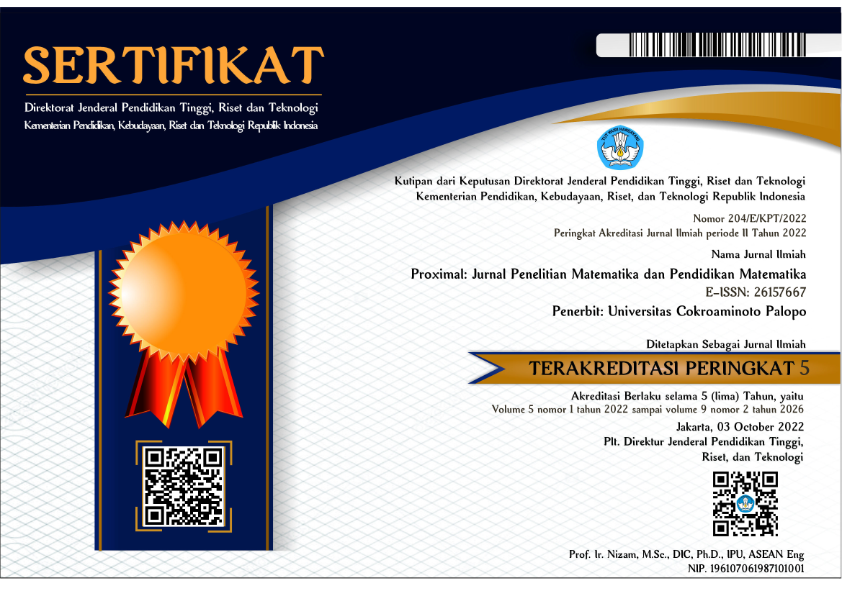Efektivitas Model Team Games Tournament Berbantuan Permainan Tic Tac Toe Terhadap Kemampuan Literasi Matematis Siswa S<P
DOI:
https://doi.org/10.30605/proximal.v8i3.6057Keywords:
Kemampuan Literasi Matematis, Team games tournament, Tic Tac ToeAbstract
Tujuan penelitian ini untuk mengetahui model Team Games Tournament berbantuan permainan Tic Tac Toe efektif terhadap kemampuan literasi matematis pada siswa SMP. Jenis penelitian kuantitatif dengan Quasi Eksperimen. Desain penelitian menggunakan Nonequivalent control group design. Populasi pada penelitian ini ialah seluruh siswa SMP kelas VIII pada sekolah penelitian. Penentuan sampel berbantuan teknik purposive sampling dengan jumlah sampel sebanyak 68 siswa kelas VIII yang berada di kelas VIII D sebagai kelas eksperimen dan VIII B sebagai kelas kontrol. Data penelitian diperoleh melalui instrumen tes kemampuan literasi matematis, lembar observasi kemampuan guru dalam mengelola pembelajaran dan angket respon positif siswa. Adapun hasil penelitian yaitu model Team Games Tournament berbantuan permainan Tic Tac Toe efektif terhadap kemampuan literasi matematis pada siswa SMP. Hal ini dibuktikan melalui melalui hasil uji- t satu pihak dengan angka 8,528 > 1,67 yang berarti ditolak. selain itu, ketercapaian literasi matematis siswa mencapai kategori “baik” dan hasil indikator efektivitas pembelajaran pada respon positif siswa berada dikategori “sangat positif”, hasil belajar siswa menunjukan ketuntasan lebih dari 80% dan kemampuan guru dalam mengelola pembelajaran berada dikategori “sangat baik”.
Downloads
References
Al Fath, A. M. (2021). Teams Games Tournament assisted by Tic Tac Toe media on the effectiveness of students in Learning. Al-Ishlah: Jurnal Pendidikan, 13(2), 1287-1294.
Ayunda, R., & Febriandi, R. (2023). Implementasi Model Teams Games Tournament untuk Meningkatkan Kemampuan Numerasi Siswa Sekolah Dasar. Jurnal Elementaria Edukasia, 6(4), 2078-2087.
Bandur, A., Hamsal, M., & Furinto, A. (2022). 21st Century experiences in the development of school-based management policy and practices in Indonesia. Educational Research for Policy and Practice, 21(1), 85–107. https://doi.org/10.1007/s10671-021-09293-x.
Fajriati, N., & Murtiyasa, B. (2023). Kemampuan Literasi Matematika Siswa Menggunakan Multimedia Interaktif. Jurnal Cendekia: Jurnal Pendidikan Matematika, 7(1), 945-957.
Fikriyah, S., Linguistika, Y., & Roebyanto, G. (2022). Analisis Kemampuan Literasi Matematis pada Materi Pecahan Siswa Kelas V SD. Jurnal Pembelajaran, Bimbingan, dan Pengelolaan Pendidikan, 2(11), 1093-1109.
Hidayati, V. R., Wulandari, N. P., Maulyda, M. A., Erfan, M., & Rosyidah, A. N. K. (2020). Literasi Matematika Calon Guru Sekolah Dasar dalam Menyelesaikan Masalah PISA Konten Shape & Space. JPMI: Jurnal Pembelajaran Matematika Inovatif, 3(3), 185–194. https://doi.org/10.22460/jpmi.v1i3.
Kurniawan, H. S., & Khotimah, R. P. (2022). Profil Kemampuan Literasi Matematis Siswa Dalam Menyelesaikan Soal High Order Thinking Skill. AKSIOMA: Jurnal Program Studi Pendidikan Matematika, 11(3), 1966-1977.
Lestari, E. (2017). Efektivitas Pasar sebagai Sumber Belajar untuk Meningkatkan Kecerdasan Ruang Peserta Didik: Quasi Eksperimen di SMP Negeri 1 Tawangsari Kab. Sukoharjo Prop. Jawa Tengah (Doctoral dissertation, Universitas Pendidikan Indonesia).
Moniy, Y. R., Hamid, H., & Noviyanti, M. (2024). Pengaruh model pembelajaran teams games tournament (TGT) berbasis wordwall terhadap kemampuan literasi matematika dan motivasi belajar siswa SMA pada materi program linier. Delta-Pi: Jurnal Matematika dan Pendidikan Matematika, 13(1), 138-157.
Nareswari, A., & Arfinanti, N. (2023). Systematic Literature Review: Media Pembelajaran untuk Meningkatkan Literasi Matematika. Quadratic: Journal of Innovation and Technology in Mathematics and Mathematics Education, 3(02), 67–77. https://doi.org/10.14421/quadratic.2023.032-05.
Padmakrisya, M. R., Aziz, T. A., & El Hakim, L. (2024). Literasi Matematika dan Konstruktivisme Sosial. AKSIOMA: Jurnal Matematika Dan Pendidikan Matematika, 15 (1), 27–38.
Setyawati, R. D., & Nursyahida, F. (2017). Profil kemampuan literasi matematika siswa berkemampuan matematis rendah dalam menyelesaikan soal berbentuk PISA. AKSIOMA: Jurnal Matematika dan Pendidikan Matematika, 8(2), 33-42.
Sutrimo, M. S., Sajdah, S. N., Sinambela, Y. V. F., & Bagas, R. (2024). Peningkatan literasi numerasi melalui model pembelajaran dan hubungannya dengan kemampuan self-efficacy: Systematic literatur review. JPMI (Jurnal Pembelajaran Matematika Inovatif), 7(1), 61-72.
Sugiyono. (2015). Metode Penelitian Pendidikan (Pendekatan Kuantitatif, Kualitatif, dan R&D). Alfabeta.
Sukestiyarno, Y. L. (2021). Metode penelitian pendidikan. Educational research methods]. Semarang: UNNES Press.
Syafi’i, M. (2018). Semangat Literasi Matematika pada Pengembangan Model Pembelajaran Kooperatif Teams Games Tournament (TGT) Guna Meninggkatkan Hasil Belajar Matematika Siswa. Jurnal Ilmu Pendidikan (JIP) STKIP Kusuma Negara, 9(2), 85-94.
Rowanti, A. (2020). Analisis Literasi Matematika Dalam Menyelesaikan Soal Cerita Pokok Bahasan Kecepatan Dan Jarak Siswa Kelas Vsdn Balung Lor 03 (Doctoral dissertation, Fakultas Keguruan Dan Ilmu Pendidikan Universitas Jember.
Downloads
Published
How to Cite
Issue
Section
License
Copyright (c) 2025 Syarahma Framdhika Sari Putri

This work is licensed under a Creative Commons Attribution 4.0 International License.
In submitting the manuscript to the journal, the authors certify that:
- They are authorized by their co-authors to enter into these arrangements.
- The work described has not been formally published before, except in the form of an abstract or as part of a published lecture, review, thesis, or overlay journal.
- That it is not under consideration for publication elsewhere,
- That its publication has been approved by all the author(s) and by the responsible authorities – tacitly or explicitly – of the institutes where the work has been carried out.
- They secure the right to reproduce any material that has already been published or copyrighted elsewhere.
- They agree to the following license and copyright agreement.
License and Copyright Agreement
Authors who publish with this journal agree to the following terms:
- Authors retain copyright and grant the journal right of first publication with the work simultaneously licensed under Creative Commons Attribution License (CC BY 4.0) that allows others to share the work with an acknowledgment of the work's authorship and initial publication in this journal.
- Authors are able to enter into separate, additional contractual arrangements for the non-exclusive distribution of the journal's published version of the work (e.g., post it to an institutional repository or publish it in a book), with an acknowledgment of its initial publication in this journal.
- Authors are permitted and encouraged to post their work online (e.g., in institutional repositories or on their website) prior to and during the submission process, as it can lead to productive exchanges, as well as earlier and greater citation of published work.















